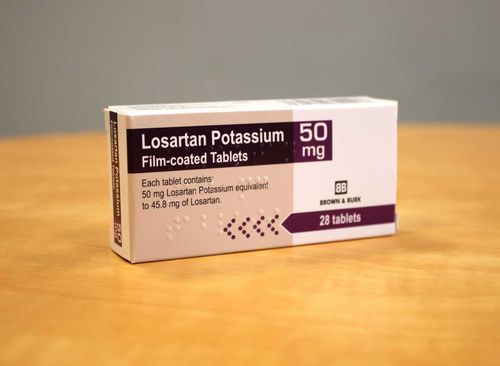This is an automatically translated article.
Vorapaxar is a stroke and heart attack prevention medication, used in people with a history of heart attack or poor blood flow. Common side effects of Vorapaxar are easy bruising and prolonged bleeding.
1. What does Vorapaxar do?
Vorapaxar is used to prevent heart attack and stroke in people with a history of heart attack or poor blood flow, which affects circulation in the arms and legs. It works by preventing platelets (a type of blood cell) from sticking together to form a blood clot. These blood clots can cause heart attacks, strokes and other serious problems. Vorapaxar helps blood flow in the body more easily.
Heart attack prevention drug Vorapaxar can be used alone or sometimes in combination with other antiplatelet agents such as Aspirin, Clopidogrel.
2. How is Vorapaxar used?
Vorapaxar is taken by mouth, usually once daily. Patients need to take the medicine regularly to get the best results. Taking the medicine at the same time each day will help maintain a steady concentration in the body.
If your doctor prescribes Vorapaxar with other antiplatelet drugs such as Aspirin, Clopidogrel,... Follow your doctor's instructions carefully.
Do not increase your dose or take Vorapaxa r more often than prescribed by your doctor. The patient's condition will not improve faster, on the contrary, the risk of experiencing side effects from the drug will increase.
Continue taking the stroke prevention medication Vorapaxar even if your symptoms improve. Do not stop taking the medicine on your own without consulting your doctor.

Đau dạ dày là một tác dụng phụ khi sử dụng thuốc Vorapaxar
3. Vorapaxar side effects
Common side effects of Vorapaxar are easy bruising, bleeding... Patients should tell their doctor if these effects are severe or prolonged.
Most people who use the stroke prevention drug Vorapaxar experience no significant side effects. However, in rare cases, serious side effects may occur, such as:
Bleeding that doesn't stop or is excessive. Stomach pain, abdominal pain, nausea, persistent vomiting. Cough or vomiting blood, vomit that looks like coffee grounds, bloody or black stools, bloody urine. Severe headache, confusion, dizziness, unusual drowsiness. Fainting, convulsions, unusual weakness, weakness on one side of the body, slurred speech,... Patients should call a doctor or seek medical help if, after taking the drug, the body shows symptoms such as: above.
Allergic reactions to Vorapaxa r are very rare, but can pose a serious threat to the patient's health. Patients should seek medical help immediately if after taking the drug have symptoms such as rash, itching, swelling, difficulty breathing,...
Also, tell your doctor if you are taking Vorapaxar while taking this medicine. side effects not listed above.
4. Notes when using Vorapaxar
Before taking Vorapaxar, please tell your doctor if:
Allergy to Vorapaxar or other ingredients of the drug. Having a medical history, especially stroke, bleeding in the brain, stomach ulcer, hemophilia, recent surgery, serious injury, liver disease,... Other precautions when taking the drug These include:
While taking Vorapaxa r, it may take longer for the patient to stop bleeding if the hand is cut or injured. To reduce the risk of bleeding, patients should use caution when using sharp objects such as razors and nail clippers and avoid contact sports activities. The patient remained at high risk of bleeding for about 4 weeks after stopping the drug. Limit alcohol and alcoholic beverages while taking the drug, as this can increase the risk of stomach bleeding. Before having surgery, tell your doctor that you are taking Vorapaxar. Vorapaxar should be used during pregnancy only when clearly needed, when the doctor weighs the benefits of the drug outweigh the risks. It is not known whether Vorapaxar passes into breast milk. Consult your doctor about taking Vorapaxar while breastfeeding.

Người có tiền sử loét dạ dày nên thông báo với bác sĩ trước khi dùng thuốc Vorapaxar
5. Drug interactions
To prevent potential interactions between Vorapaxar and concomitant medications, patients should tell their doctor about all products they are taking. Do not use, stop, or change the dosage of any medication without your doctor's approval.
Some drugs that can interact with Vorapaxar include: Tipranavir, antidepressants, anticoagulants. Drugs that can affect the elimination of Vorapaxar from the body such as: azole antifungals, cobicistat, HIV protease inhibitors, hepatitis C virus protease inhibitors, medicines used to treat convulsions... Antipyretic and analgesic drugs such as Aspirin, NSAIDs... also have antiplatelet effect. Using Vorapaxar with these drugs increases the risk of side effects. However, if a patient is taking low-dose aspirin (usually at doses of 81-325mg per day) as prescribed by their doctor to prevent a heart attack or stroke, they should continue to take aspirin unless directed to do so by their doctor. other.
6. Some other notes when using Vorapaxar
If the patient forgets to take a dose of Vorapaxar, take it as soon as you remember. If it is almost time for your next dose, skip the missed dose and take your next dose at the usual time. Do not take a double dose of Vorapaxar to make up for a missed dose.
Store Vorapaxar at room temperature, away from direct light and high humidity, keep it out of reach of children.
In a nutshell, Vorapaxar is a stroke and heart attack prevention medication, used in people with a history of heart attack or poor blood flow. To achieve the best treatment effect as well as limit the side effects of the drug, the patient should take it as prescribed by the doctor.
Please dial HOTLINE for more information or register for an appointment HERE. Download MyVinmec app to make appointments faster and to manage your bookings easily.
Reference source: webmd.com












